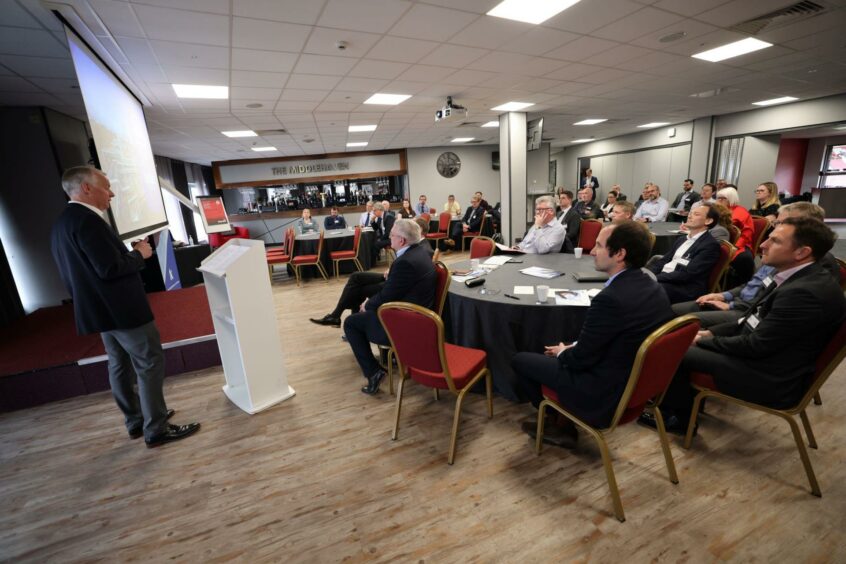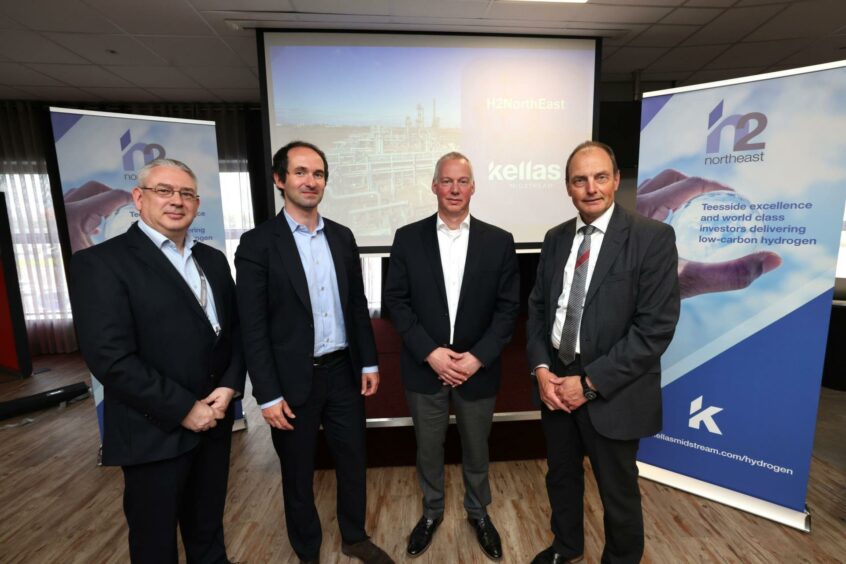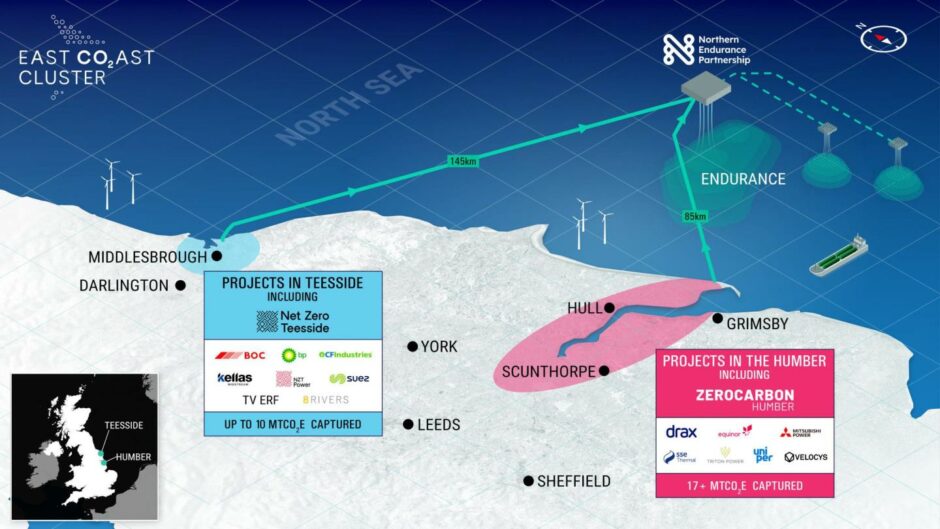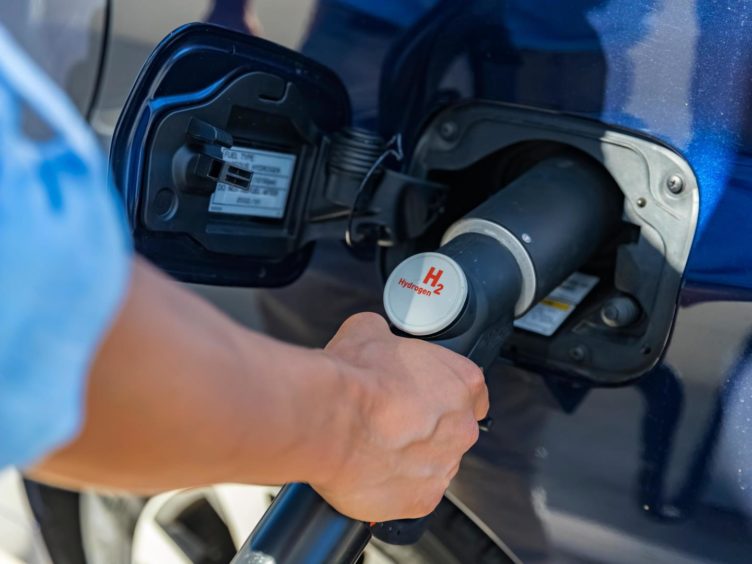
It is full steam ahead for Aberdeen-headquartered Kellas Midstream as it plans to push on with a £750 million investment for a major blue hydrogen project.
And there could be spill over employment benefits from the H2NorthEast scheme, earmarked for the north-east of England, for Aberdeen too, where the energy infrastructure company is headquartered.
A final investment decision on the 1 gigawatt (GW) low carbon blue hydrogen project is expected in 2024.
H2NorthEast is expected to create around 100 jobs and allow almost 20 workers to upskill.
Meanwhile hundreds more are expected to be created during construction and across the supply chain.
The project, currently in the concept select stage, was the focus of a stakeholder engagement session hosted by Kellas today at the Riverside Stadium, home to Middlesbrough FC.
Local government, potential hydrogen off takers, and academia were in attendance at the event, which gave an overview of the benefits of H2NorthEast, and hydrogen on Teesside in general.
Speaking alongside Kellas leaders were Chris Beck, group director clean growth and innovation at Tees Valley Combined Authority, Kurt Fredheim, general manager at Norsea’s seal sands terminal, and Thomas Luypaert from Blackrock private equity infrastructure investors, one of Kellas’ owners.
Andy Hessell, Kellas managing director, said: “The Humber and Teesside industrial regions represent almost 50% of carbon emissions from all UK industrial clusters. Converting to low carbon hydrogen is the only realistic way to decarbonize those industries, and in doing so help the UK achieve its target of net zero emissions by 2050. We believe that H2NorthEast can play a leading role in delivering low carbon hydrogen to industries on Teesside at a lower cost through synergies with our CATS facility and by using existing distribution and storage infrastructure.”
H2NorthEast will be based around Kellas Midstream’s CATS (Central Area Transmission System) terminal at Teesside.
Under the current project timeline, ir will start to deliver 355 megawatts (MW) of low carbon hydrogen in 2027, upscaling to 1GW by 2030.
A handful of offtake agreements have already been struck with companies nearby as heavy industry kicks on with efforts to decarbonise its activities.
H2NorthEast has already been named as one of the UK’s first carbon capture, usage, and storage (CCUS) developments through its involvement in the East Coast Cluster, which secured Track 1 status last year.
It is also one of several hydrogen projects running in the UK Government’s phase 2 cluster sequencing process.
Blue hydrogen is made using natural gas, through a process called steam methane reforming, with any emissions abated using CCUS.
Kellas expects H2NorthEast to have carbon capture efficiency of 97% and to offset two million tonnes of carbon a year.
The scheme will hook in to CCUS projects delivered as part of the East Coast Cluster, with emissions being stored in the Endurance reservoir under the North Sea.
Mr Hessell said that from a “standing start” 18 months ago, Kellas, which has its main base in the Silver Fin on Union Street, Aberdeen, is now getting into hydrogen in a big way.
He said: “We refreshed our business strategy just over two years ago and it was underpinned by three themes. The first is delivering safe, reliable efficient operations for our business.
“The second is growing our conventional business, through things like acquisitions, new investments, and new assets, and we’re looking to invest more in our core gas infrastructure.
“We then defined a third theme of our strategy, which is about building a third business around net zero. It is a great growth area; some see it as a threat, but we don’t. The big thing we really kicked off just over a year ago was looking at hydrogen, and how we can invest in production.
“After some initial research, it was blindingly obvious that we had the perfect location to build a hydrogen plant at the gas terminal.”
Wesminster recently unveiled its long awaited Energy Security Strategy.
Included within it is a commitment to double the UK’s 2030 targets for hydrogen production to 10GW.
H2NorthEast would deliver as much as 10% of the government’s goal while also allowing Kellas to use its gas handling expertise to help heavy industry zero out emissions.
Tees Valley Mayor Ben Houchen said: “H2NorthEast is a truly forward-thinking initiative that unites the region’s net zero ambitions with infrastructure investment and skills development, helping to further mark us out in the cleaner, safer and healthier industries of the future. The project has the potential to upskill existing jobs and create hundreds of new good-quality, well-paid jobs for people across Teesside, Darlington and Hartlepool, while boosting our local economy by as much as £300m.”
Recommended for you


 © Supplied by Kellas Midstream
© Supplied by Kellas Midstream © Supplied by East Coast Cluster/
© Supplied by East Coast Cluster/ © Shutterstock / Literator
© Shutterstock / Literator